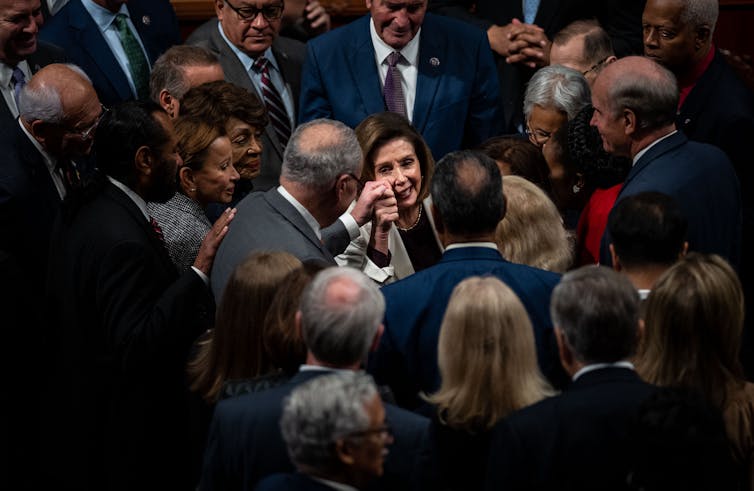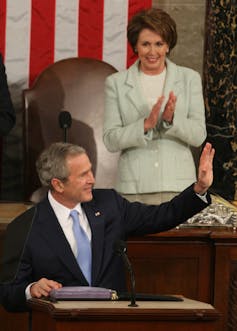
Kent Nishimura / Los Angeles Times via Getty Images
Gerald Warburg, University of Virginia
The announcement by House Speaker Nancy Pelosi that she will not run for another senior post opens the door for a new generation of national leaders in the Democratic Party.
Pelosi confirmed she was stepping down as Speaker of the House on Nov. 17, 2022, a decision that jump-starts a process that has long been desired by younger Democrats: generational change and with it, potentially, new ideas to take the party forward.
That shift to younger leadership was shelved in February 2020. Then – after poor performances by Joe Biden in early primaries – Democratic primary voters unified with astonishing swiftness behind his candidacy. The thinking was that a veteran party establishment official was needed to block Donald Trump and that the progressive agenda desired by some younger Democrats might pose too great an electoral risk.
Turnover in the youth-challenged leadership of the Democratic House and Senate caucuses has similarly been frozen since then, with all Democratic legislative leaders over 70. As a professor of public policy who served as an assistant to members of leadership in both houses of Congress, I understand why Democratic voters opted for stability in 2020. But now the coming change may be welcomed by Democrats and Republicans alike as an opportunity to pass the torch to a new, post-baby boomer generation with fresh ideas. Generational change may soon come on both sides of the political aisle.
Power as a means, not an end
Pelosi’s decision is both practical and timely. It comes as the Republicans retake the House with a wafer-thin majority and a divided GOP caucus at war with itself. Even former Republican speakers John Boehner and Newt Gingrich, Pelosi’s longtime critics, are acknowledging her historic accomplishments, while noting her legacy will now include stepping away while at the top of her game.
Pelosi rose to become the most powerful woman in American history and the most effective legislator of the 21st century. She accomplished this at a time when polarization in politics meant she has endured vilification from political opponents that has had a direct and violent impact on her family.
A key to understanding the Pelosi legacy is weighing what she chose to do with her power. As I have written elsewhere, some politicians seek power fundamentally as a means to an end. For them leadership posts offer the tools needed to improve citizens’ lives or to advance an ideology. Such figures can be seen across the political divide in Ronald Reagan, Barack Obama and Gingrich. You don’t have to agree with their politics to see that they sought power primarily as a means to change policy: They had active legislative agendas.
Other leaders, however, seem to seek out power as part of a never-ending vanity project.
The history of Pelosi’s two four-year speakerships – from 2007 to 2010 and then again from 2019 to 2022 – provide evidence that she had an action agenda. Pelosi is on record repeatedly insisting that when one gains power, one should use it – and risk losing it – to promote the national interest and protect the most vulnerable.
Her record bears out that approach. In 2008 through 2010, she pushed controversial measures through the House, including the TARP economic bailout, the stimulus package, the Affordable Care Act, and the cap and trade climate bill – risking her political capital and imperiling the Democratic majority in the House.
Similarly in 2022, she pursued an ambitious legislative agenda despite concerns that it might contribute to a Republican “red wave” in the midterm elections. That wave did not materialize, but historically small Republican gains were enough to mean she would lose the speakership of the House.
Managing imperiled presidencies
The longevity of Pelosi’s tenure is all the more remarkable given the fact that she worked alongside four different – and often troubled – presidencies. She first became House speaker in 2007 under the lame duck presidency of George W. Bush.

Rich Lipski/The The Washington Post via Getty Images
Then she served that role under Obama just before his “shellacking” in midterm elections; Trump through two impeachments and an insurrection; then Biden, saddled with bitter national divisions. The Pelosi speakership was the one constant as four different presidents dealt with national threats.
Yet Pelosi managed to work through a deeply polarized Congress scores of bills that impacted the lives of everyday Americans. Her legislative accomplishments include her stewardship of the landmark Affordable Care Act. She worked with Bush to rescue the American economy in the financial crisis of 2008 – when the Republican caucus refused to provide votes needed to shore up the economy.
She also worked with the reluctant Trump administration to provide pandemic relief amid a global health crisis and in early 2022 shepherded through Congress the largest infrastructure investment bill ever.
Toughness leading a divided caucus
Profiles of Pelosi invariably comment on her toughness, a quality admired by both Obama and Boehner. She also led a Democratic caucus often divided by ideology, region, culture, identity politics and generational differences. Some on the left suspected her establishment ties. Critics on the right gleefully vilified her as some “San Francisco socialist.”
Even the professorial Obama confessed he sometimes felt hectored by her passionate advocacy. Republicans campaigned repeatedly on the simple pledge to “Fire Pelosi,” spending hundreds of millions on crude ads devoid of a legislative agenda.
One can disagree with her positions, however, while still recognizing that Pelosi has been a fierce and effective advocate advancing her majority’s agenda.
The record shows that her results-oriented approach has been consistent in its goals and clear in its principles. Such clarity has provided leadership to the nation in fractured times. Her singular focus on advancing her caucus’ legislative agenda has made her the key Democratic Party messenger of her generation.
She has now had the courage to step back, making way for a new leaders and new ideas.![]()
Gerald Warburg, Professor of Practice of Public Policy at the Frank Batten School of Leadership and Public Policy, University of Virginia
This article is republished from The Conversation under a Creative Commons license. Read the original article.
















